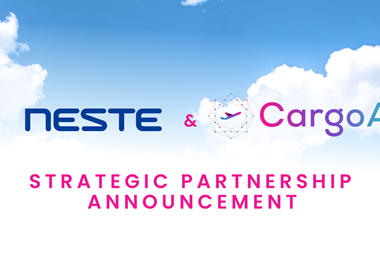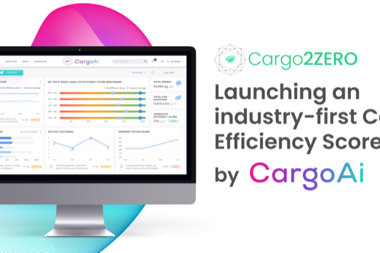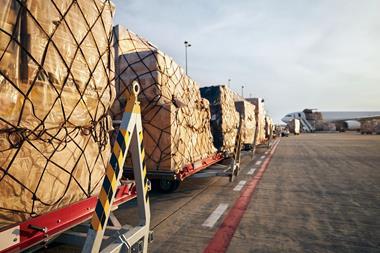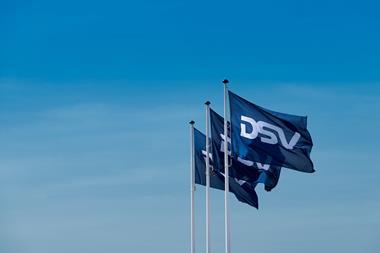TV character Kermit the frog once sang ‘it’s not easy being green’, a sentiment that CargoAi chief executive Matthew Perot can relate to after launching a range of carbon reduction services over the last 18 months.
Speaking at the recent Tiaca Air Cargo Forum event in Miami, Petot says that each of its emission services took time and effort to develop.
The first step in the company’s journey was to develop and launch a carbon calculator, which is based on the IATA RP1678 methodology approved by the Global Logistics Emissions Council (GLEC).
Next came an efficiency score based on the calculator, which allows forwarders to filter capacity offers according to the greenest options.
This means forwarders can evaluate a shipment’s potential CO2 emissions in the same way they would evaluate a shipment based on the schedules and rates that come up during a search of the portal.
The sum of a forwarder’s booking decisions is then available in the Cargo2ZERO report which shows every booked AWB and its respective CO2 emissions.
Petot says several months of development work went into building the complex calculation system, with impartiality the primary goal.
He explains that all the calculations needed to be accurate and neutral to make sure that airlines do not have any qualms.
Most recently, the booking portal added an option for users to purchase Sustainable Aviation Fuel (SAF) alongside their bookings.
Petot says the SAF agreement with fuel producer Neste took several months to finalise.
“We took some time, Neste is a big company, it is an oil company, it took about six months to work on the detail,” he says.
“What it means is that a forwarder, when they make a booking, can click and then go on a page where they can purchase SAF.”
Petot says that most of the SAF deals being announced in cargo at present involve the larger forwarders purchasing tonnes of SAF from the airlines.
However, it is harder for small and medium players to be able to make investments in SAF.
“If you are a medium or small forwarder in Colombia or Australia, for example, it is hard to understand how it works, who to contact, so you probably won't sign a deal.”
He adds that smaller airlines can benefit if they do not have the reach to create their own SAF programme - CargoAi can offer a white label page that will allow them to add their own branding.
“They can tell their customers; every time you make a booking with us you can go on our website and you can use the system.”
Petot says that CargoAi doesn’t make any commission from Neste, so why has it decided to pursue this emissions reduction drive?
Firstly, he says, CargoAi is a young company and environmental issues are important to younger members of the team.
Secondly, he says that having a SAF option helps differentiate from the other booking platforms.
“Our product is putting all the dots together and it also makes our platform more attractive,” he says.
Thirdly, he believes environmental regulations will ramp up in the future so having a SAF option means CargoAi is ahead of the curve.
“We know the world is changing and there will be more and more regulation coming from Europe and when it comes it will be quick,” Petot explains.
“At the moment, inflation is a problem for governments so they can't have carbon tax as much as they want.
“But as soon as inflation starts to slow down, they will push this as a topic and then they will go back to the supply chain guys and we will have the solution ready.”
Last, but not least, sustainability is playing an increasingly important role in business decisions, with shippers requesting full transparency on CO2 emissions per AWB and forwarders setting Scope 3 Science Based Targets Initiative reduction targets, which they are required to report on.
With CargoAi not being an airline, there is also the question of how exactly it will utilise the SAF if it does not operate any aircraft?
Petot explains that SAF comes from a central pool and the fuel purchased might actually be supplied for another flight entirely.
Petot adds that forwarders can also specify how much they would like to offset in percentage terms and they can also use the service for repeat SAF purchases.
Online bookings continue to take off
Elsewhere, Petot says the use of online booking platforms continues to accelerate.
“It is not calming down because we are adding more airlines and people aren't going back and saying they prefer to use my email or my phone. That does not happen,” he says.
“And there is a lot of room to grow. We have still have a long way to go as there are still a lot of bookings being made on the phone.
“Our main competitor is not the other portals, it is email and the phone.”
There are also plenty of airlines that are yet to connect with CargoAi, with Perot naming United, Delta, Cargolux, Cathay Pacific, Korean Air and Singapore Airlines as examples.
Petot says that it is also becoming more important to differentiate from the other platforms.
He points out that forwarders will often search across the three main platforms before making a booking.
“Until now, the main differentiator was the airlines, but we all increasingly start to have the same airlines,” he says.
“So now it comes down to the user experience and the functionality and that is where we are in a good place.
“We are modern, we have a good user experience, more features, we can handle things like spot requests, we can do import dimension with text.
“Sustainability is also one of our differentiators,” he adds.















